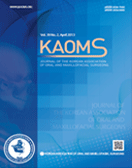Journal of the Korean Association of Oral and Maxillofacial Surgeons
- P-ISSN2234-7550
- E-ISSN2234-5930
- SCOPUS, KCI, ESCI
 ISSN : 2234-7550
ISSN : 2234-7550
The effects of β-TCP/rhBMP-2 on bone formation in osteoblast-like cells induced from bone marrow-derived mesenchymal stem cells
Abstract
The present study aimed to investigate the osteogenic potentials of differentiated osteoblast-like cells (DOCs) induced from bone marrow-derived mesenchymal stem cells (MSCs) on β-tricalcium phosphate (β-TCP) with recombinant human bone morphogenetic protein (rhBMP-2) in vitro. Osteoblast differentiation was induced in confluent cultures by adding 100 nM dexamethasone, 10 mM β-glycerophosphate, 50 mM L-ascorbic acid. The Alizarin red S staining and reverse transcriptase-polymerase chain reaction (RT-PCR) were perfomed to examine the mRNA expression of alkaline phosphatase (ALP), bone sialoprotein (BSP), osteocalcin (OCN), receptor activator for nuclear factor κB ligand (RANKL), runt-related transcription factor 2 (RUNX2), collagen-Ⅰ (COL-Ⅰ). There were no significant differences in the osteogenic potentials of DOCs induced from MSCs on β-TCP(+/-). According to the incubation period, there were significant increasing of Alizadin red S staining in the induction 3 weeks. The mRNA expression of ALP, RUNX2, and RANKL were higher in DOCs/β-TCP(-) than DOCs/β-TCP(+). According to rhBMP-2 concentrations, the mRNA expression of BSP was significantly increased in DOCs/β-TCP(+) compared to that of DOCs/β-TCP(-) on rhBMP 10 ng/ml. Our study presented the β-TCP will have the possibility that calcium phosphate directly affect the osteoblastic differentiation of the bone marrowderived MSCs.
- keywords
- mesenchymal stem cell, rhBMP -2, β-TCP, differentiated osteoblast-like cell
- Downloaded
- Viewed
- 0KCI Citations
- 0WOS Citations